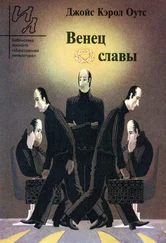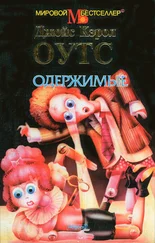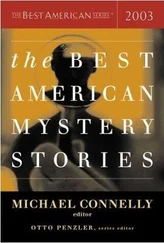Has something been decided? The middle daughter, the bossy one, high school principal, has taken Jessalyn firmly by the arm.
Daddy is doing really well. He looks better—his color is much better. You know Whitey—… “never say never.”
The daughters laugh together. Jessalyn hears herself join in, weakly.
“Never say never” —it is indeed an expression Whitey uses often.
Feeling so very tired, a watery sensation in her brain, knees like water, trembling with cold, Jessalyn supposes she has no choice, must give in. Abandoning Whitey to this terrible place—(if he wakes, whom will he see?—what?)—she stoops to brush her lips against his (slack, chill) cheek, dares to approach his shuddering breath.
Love you, darling! Praying for you.
How Whitey would wince, and laugh. Praying for me? Must be bad news.
In a confiding voice a nurse is urging the McClaren daughters— Take your mother home . Jarring to hear your mother spoken as if she (Jessalyn) were not even present. Is this a presage of being elderly, elderly and infirm?—gently-but-firmly “walked” along a corridor and your every movement scrutinized for if you falter, if you appear dizzy, in danger of fainting strong (i.e., younger) arms will seize you and support you; and Jessalyn McClaren is not the sort of person who causes a disruption in any quasi-public place, has always been the most courteous, the most obliging, the least assertive of persons, a lovely woman, a beloved woman, wife, mother, grandmother, trying not to feel panic at the prospect of her husband not home .
Just a single night. Unthinkable.
One by one they’d moved away from the house on Old Farm Road to become adults in the world beyond the McClarens.
And now, this harrowing succession of days in October 2010 when their father was hospitalized in the aftermath of a stroke, and their vigil was a flimsy shared raft on a choppy river, and their eyes did not dare lift much above the level of the river for fear that the dark, surging waters would engulf them, they found themselves returned to the house each night as if to the safety of dry land.
Yet it was strange to them, it was eerie and unsettling, the house had changed so little since they’d left, and they had changed so much.
Or, the house had not changed so much, and they had scarcely changed (inwardly, essentially) at all.
“I’LL STAY WITH MOM TONIGHT.”
“No. It’s fine. I live close by, I can stay with her.”
“I drove her to the hospital, so I’ll stay, and drive her back to the hospital in the morning. It’s just easier.”
“Why’s it easier ? I should drive her tomorrow.”
“You’ll just upset her. You’re always so grabby .” Meanly, Lorene made a gesture with both hands as if tugging at a cow’s teats.
Stung, Beverly objected: “You’ll have to go to work—won’t you? They can’t function at the high school without the ‘She-Gestapo’—can they?”
Lorene cast her sister a look of sheer savagery. It must have been, Lorene knew of her She-Gestapo reputation at North Hammond High but had not known that the others knew.
“Of course I’m not going to work tomorrow. Not as long as my father is in Intensive Care!”
Eventually it was determined that, except for Beverly, who felt that she must return home to her family that night, they would all stay at the old house with their mother.
“Just in case. We’d better.”
Jessalyn was given no voice in the matter. She didn’t know whether to be touched by her adult children’s solicitude, or to feel oppressed by it. Why were they speaking of her as if she weren’t even present? Seeming to think that she shouldn’t be alone in her own house as if she were very elderly, or very unstable.
Jessalyn protested, weakly: she could drive herself to the hospital in the morning. She would meet them there. “The nurse said—seven A.M. Certainly, I will be all right tonight…”
“Mom, no . Daddy would never want you to be alone at such a time.”
None of them would listen to her. Jessalyn was forced to see how they were all taller than she was, and loomed over her. When had this happened? Even Sophia, the youngest.
In their faces, defiance. Though they were exhausted, and anxious, this opposition was thrilling to them, that they might overcome their mother’s wishes in the service of protecting her. She opened her mouth to protest but felt too tired, suddenly.
And it would be comforting, certainly—to have someone stay with her.
She would tell Whitey— The children took over. They were so protective of me. You’d have been proud of them.
Dear Whitey! He was always looking for ways to be proud of his children, and not annoyed and irritated as he was so often with Virgil.
Yes of course Virgil was with us. Every minute.
When the terrible news had come that afternoon, for several hours her brain had shut down. But now that Whitey appeared to be holding his own she was collecting things to tell him.
It was a cheering phrase, especially out of the mouths of the Intensive Care nurses who, presumably, knew what they were saying.
Holding his own . You had an image of Whitey gripping something tightly, a rope perhaps, a rudder. Holding himself steady even as the floor shifted beneath him.
He would want to know—everything! How he’d been discovered in his car on a shoulder of the Hennicott Expressway, or (possibly) he had tried to get out of the car, and collapsed and fallen onto the pavement. How Hammond police officers had discovered him—unconscious. How they’d called 911 and an ambulance had come (within four minutes, it was claimed) and brought him to the very best emergency medical facility within one hundred miles.
Saving up things to tell Whitey. Nearly forty years.
Mostly these were things about which no one else would care in the slightest. Every small, inconsequential, fascinating tidbit to tell her husband who, like most men, pretended to disapprove of gossip but relished it. As he saved up things to tell her.
Darling, I was so lonely! But I could hear your voice—I could hear our children’s voices—though I could not answer you—and I could not see you…
She had faith, her husband would tell her where he’d been. As soon as he was returned to her.
“I’LL TAKE YOU UPto bed, Mom. Come on!”
As soon as they were at the house. Switching on the kitchen lights.
Beverly reached for Jessalyn’s hand, and would not release it, though Jessalyn protested, “Don’t be silly, Beverly. I can ‘take’ myself to bed, thank you.”
“You’re exhausted. You should see yourself—your face is white as wax .”
Beverly insisted. For she was going home, soon. But Lorene insisted, also. And Sophia could not bear to be left behind.
Six of them, entering the kitchen. So many McClarens, you’d expect a festive occasion.
Jessalyn continued to protest faintly as the sisters accompanied her upstairs. Their voices lifted like the cries of birds, lightly chiding, melodic. In the kitchen Thom and Virgil were left behind with each other.
They resented their sisters, perhaps. Not entirely consciously but—it was so, in a time of crisis, in a time of emotions, in a time when (physical) comfort was required, daughters took precedence over sons.
“Want one of Dad’s beers? Ale?”—Thom opened the refrigerator and took out two bottles of dark brown ale. Virgil shrugged— No.
“Oh, I forgot. You ‘don’t drink.’”
Stiffly Virgil said, “Yes. I do. Sometimes. But not now.”
Читать дальше












